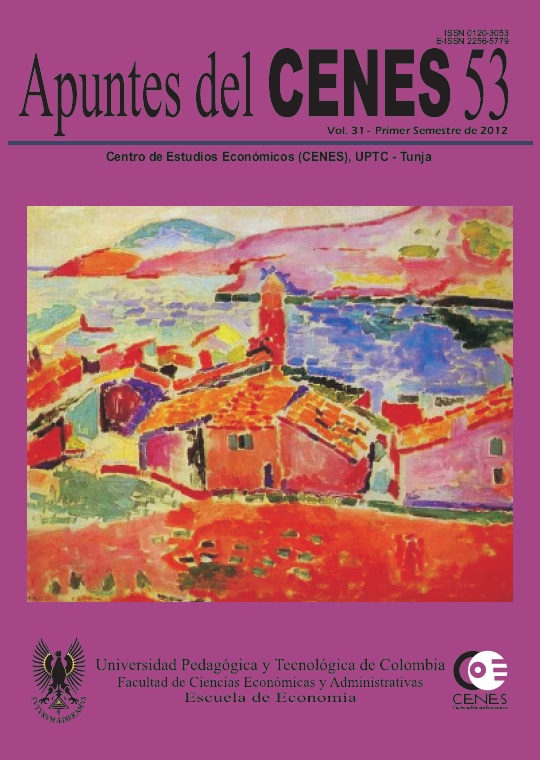Capitalist globalization: mechanisms of economic and political regulation

Abstract
This article makes a theoretical analysis on the mechanisms that influence governments elections, likewise the collective action in decentralized networks as ways from which citizens can regulate the political decisions and, through these, also regulate economic decisions within the framework of capitalist globalization. Mechanisms on the first track are analyzed based on theory principal-agent, and on the second one, from the theory of social networks. In both cases, the difficulty lies in the effective implementation of the devices for the achievement of the proposed objectives. On these mechanisms, it is possible to identify some conditions to bring effectiveness and power to citizen political action, which are related to the new sociopolitical dynamics.Keywords
Mechanisms, political economy, capitalism, trade liberalization
References
- Beck,U.(1997).La reinvención de la política: hacia una teoría de la modernización reflexiva. En Beck, & Lash Giddens. Modernización reflexiva. Política, tradición y estética en el orden social moderno. Madrid: Alianza Editorial.
- Burt, R. (1992). Structural Holes: The Social Structure of Competition.Cambridge: Harvard University Press.
- Burt. R (2004). Structural Holes and Good ideas. American Journal of Sociology, 110 (2).
- CEPAL.(2000). Globalización y Desarrollo. Santiago de Chile.
- Elster,J.(1999). Accountability in Athenian Politics. En Przeworski & Stokes Manin (eds.), Democracy, Accountability and Referencias bibliográficas 24 Globalización capitalista: mecanismos de regulación económica y política William Ortiz Jiménez Representation. Cambridge: Cambridge University Press.
- Fearon, J. (2002). Electoral Accountability and the control of politicians: Selecting good types versus sanctioning poor performance. En Przeworski, Stokes & Manin, (eds.). Democracy, Accountability and Representation. Cambridge: Cambridge University Press.
- Ferejohn, J. (1999). Accountability and Authority: Toward a Theory of Political Accountability. En Przeworski, Stokes, & Manin (eds.). Democracy, Accountability and Representation. Cambridge: Cambridge University Press.
- González, S. (2009). Networks and mechanisms of interdependence. theoretical developments beyond the rational action model. Revista Internacional de Sociología, 67 (3), 537-558.
- Herreros, F. (2005). Las elecciones y la tradición republicana. Revista Española de Ciencia Política, 12.
- Manin, B. (2006). Los principios del gobierno representativo. Madrid: Alianza Editorial.
- Manzano, D. (2002). Introducción: ¿Son las elecciones un mecanismo efectivo de representación?. Zona Abierta, 100-101.
- Maravall, J. M. (1999). Accountability and Manipulation. En Przeworski, Stokes, B. Manin (eds.). Democracy, Accountability and Representation. Cambridge: Cambridge University Press.
- Milgram, S.(1967).The small world problem. Psychology Today, 2.
- Molina, I. (1998). Conceptosfundamentales de ciencia política. Madrid: Alianza.
- Morlino,L.Montero,J.R.(1995). Legitimacy and democracy in southern Europe. En Gunther, Richard; Nikiforos Diamandouros & Hans –Jürgen Puhle. The politics of democratic consolidation. Southern Europe in Comparative Perspective. Baltimore: The Johns Hopkins University Press.
- Noguera, J. (2007). Capitalismo y justicia: lostérminos de la cuestión. Sistema, 200.
- Ortiz,J. (2011). Democracia y partici-pación política. Divergencias entre la teoría y la práctica. Medellín: Ediciones UNAULA.
- Pitkin, H. (1985). El concepto de representación. Madrid: Centro de Estudios Constitucionales.
- Przeworski, A. (1997). Una mejor democracia, una mejor economía. Claves de la razón práctica, 70.
- Przeworski, A. (1999). On the Design of the State: A Principal-Agent Perspective. En Bresser & Spink (eds.) Reforming the State. Managerial Public Administration in Latin America. London: Lynne Rienner Publisher.
- Rosanvallon, P. (2000). La globalización exige un nuevo contrato social. PNUD: Santiago de Chile.
- Stiglitz, J. (2003). El malestar en la globalización. Madrid: Punto de Lecturas.
- Tilly, C. (2005). Los movimientos sociales entran en el siglo XXI. Política y Sociedad. 42 (2).
- Watts, D. (1999). Networks, dynamics and the small-world phenomenon. American Journal of Sociology, 105 (2).
- Watts, D. (2003). Seis grados de separación. La ciencia de las redes en la era del acceso. Barcelona: Paidós.
Downloads
Download data is not yet available.